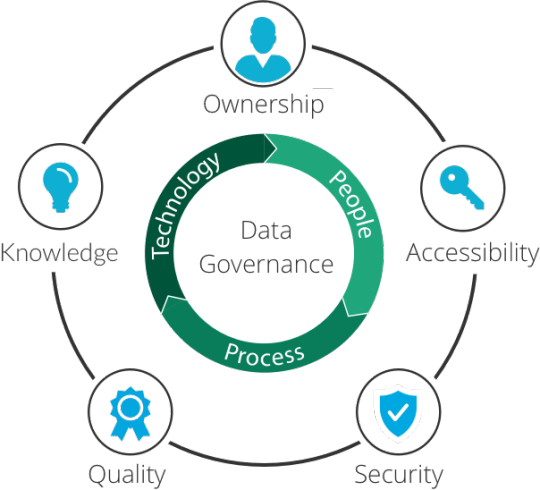Don't wanna be here? Send us removal request.
Text
What is data governance?
Data governance describes the roles, processes, and policies that organizations enact to ensure the accuracy, quality, and security of data. Their policies dictate the methods that people can use to access and take advantage of the data.
Although data governance involves the proper stewardship of data in an organization, the framework also encompasses your data strategy and goals. When implemented correctly, data governance allows you to derive value from data.
Data security and governance frameworks ensure that policies and processes align with internal and external factors, including local and national government data privacy laws and regulations. As governing bodies pass new laws, you must adjust your data governance frameworks to comply with them.
It is often difficult to implement data governance properly, as it requires you to align departments and teams. This means you need to have a clear understanding of what data you have and how you use it.
When you develop a data governance plan, you should consider the following elements:
Data Ownership: Who is responsible for managing each type of data? Data quality: How will the data be checked for accuracy and completeness? Data security: How will the data be protected from unauthorized access? Data archiving: How will the data be stored for long-term preservation?
Data Governance Tools and Benefits
Data governance tools include any software, platform, or device used to access, use, store, create, or analyze data, as well as the policies and procedures used to implement and maintain their operation.

The following are data governance tools:
Data lakes, warehouses and catalogs Data assets, such as spreadsheets, images, PDFs, and more Software and platforms used to access, analyze, and manipulate data, such as automation platforms, single point solutions, and visualization software Infrastructure used to transmit data, such as business and personal devices, servers, cameras, monitoring and medical equipment, sensors, and more Implementing a data governance framework that makes optimal use of all of these tools can benefit you and your organization through improved business value, security and compliance, data quality, and automation.
commercial value
Data governance improves your decision-making process, helps you better manage risk, and increases your operational efficiency. Data governance tools can help you collect and organize data from various sources so you can make informed decisions. Data governance can promote collaboration between different teams and departments by establishing a clear process for sharing data and information.
Security and compliance
Data governance must encompass a changing workforce, remote workers, and new compliance regulations. Your framework should include plans for onboarding, adding, and removing leaves for new, current, and former employees, all while maintaining compliance. This process will include reducing the risk of data breaches of confidential information.
Data quality
Setting rules and standards for data entry, access, storage, and use allows you to improve data quality. By ensuring data accuracy, consistency, and integrity, you can make better decisions and avoid costly mistakes. Optimizing communication and coordination lets you make better decisions and avoid duplicate work.
automation
Automation can help you ensure compliance as people access and use data; this includes data collection, quality control, and reporting. You can reduce costs by reducing the need for manual data entry and storage. Automation can also reduce the costs associated with data breaches and compliance breaches. The correct implementation of data governance can help you optimize the use of resources, improve efficiency, and free up resources so you can focus on more strategic tasks.
Data governance framework
A data governance framework helps you establish and maintain an effective data governance program. The framework provides a structured approach to defining roles and responsibilities, developing policies and procedures, and implementing tools and controls.
Organizations that have established data governance programs report several benefits, such as improved decision making, reduced risk, and optimized organizational performance. Data governance can also help organizations meet regulatory requirements.
1 note
·
View note